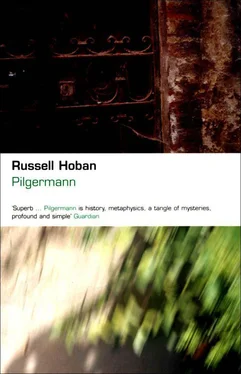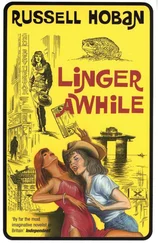Russell Hoban - Pilgermann
Здесь есть возможность читать онлайн «Russell Hoban - Pilgermann» весь текст электронной книги совершенно бесплатно (целиком полную версию без сокращений). В некоторых случаях можно слушать аудио, скачать через торрент в формате fb2 и присутствует краткое содержание. Год выпуска: 2002, Издательство: Bloomsbury Publishing PLC, Жанр: Современная проза, на английском языке. Описание произведения, (предисловие) а так же отзывы посетителей доступны на портале библиотеки ЛибКат.
- Название:Pilgermann
- Автор:
- Издательство:Bloomsbury Publishing PLC
- Жанр:
- Год:2002
- ISBN:нет данных
- Рейтинг книги:5 / 5. Голосов: 1
-
Избранное:Добавить в избранное
- Отзывы:
-
Ваша оценка:
- 100
- 1
- 2
- 3
- 4
- 5
Pilgermann: краткое содержание, описание и аннотация
Предлагаем к чтению аннотацию, описание, краткое содержание или предисловие (зависит от того, что написал сам автор книги «Pilgermann»). Если вы не нашли необходимую информацию о книге — напишите в комментариях, мы постараемся отыскать её.
Pilgermann — читать онлайн бесплатно полную книгу (весь текст) целиком
Ниже представлен текст книги, разбитый по страницам. Система сохранения места последней прочитанной страницы, позволяет с удобством читать онлайн бесплатно книгу «Pilgermann», без необходимости каждый раз заново искать на чём Вы остановились. Поставьте закладку, и сможете в любой момент перейти на страницу, на которой закончили чтение.
Интервал:
Закладка:
And God, we think that because he is all-powerful the amount of available power is always the same; but it changes, it wavers, it shifts from the kinetic to the potential, varying with the action of the universe, the action of the world, the action of the individual. Earlier I have had the thought of many mysterious unseen fragile temples in which God used to dwell among us; now I perceive that these temples are each of us however unreliable, each of us for good or ill, each of us as the total of our actions and our being. It is because of such as I that God is absent and Christ horizontal; it is because of such as I that these children are raped by skeletons on the road to Jerusalem.
I hurry to catch up with the children, I kick snoring skeletons out of my way, I trample their mouldy bones and filthy parchment skins, I tread on their great phalli and their ponderous testicles. They don’t care, they grunt and sigh and roll over in their sleep.
The children with bloody hands and knees trudge on. They are so very thin, their arms and legs are like sticks, their cheeks are hollow, their eyes sunken, truly they seem Death’s own children as they sing:
Our faith our shield,
Thy word we wield
Of love and Christian pity.
The seas will part
That pure in heart
May reach Thy golden city.
‘Brother pilgrim!’ cry the children when they see me, ‘Brother pilgrim! Have you anything to eat?’ I give them all the food I have, sausage and bread; it isn’t very much for so many. A boy who seems to be the leader thanks me and divides it with great precision. There is no more than a mouthful for everyone, they chew it slowly and with great care.
‘Have you nothing more?’ says the boy. ‘You can have, you know, any one of us you like.’
‘Look at your bloody hands, your bloody knees!’ I cry. ‘Look where your clothes are torn! You’ve just now been had by skeletons!’
The boy looks at his hands, his knees. ‘It’s a rough road,’ he says. ‘One stumbles.’
‘Selling yourselves for food,’ I say, ‘is that how you’ve been making your way to Jerusalem?’
‘We beg, we steal, we sell what we have to sell,’ says the boy. ‘God wills it.’
‘How can God will such a thing as that?’ I say.
‘If God wills that we should be on the road to Jerusalem then He wills the rest of it as well,’ says the boy. ‘Dead people can’t walk to Jerusalem, and one must eat to live.’
‘Do you know where Jerusalem is?’ I say to him. ‘Do you know how far it is to Jerusalem?’
The boy turns his face towards me and looks at me for a moment without saying anything. Looking at me out of his eyes I see the lion-eyes of Christ, and I am frightened. I hold my head because I know that when he speaks his voice will be a woodwind voice that comes from inside my head and resonates there. ‘Jerusalem will be wherever we are when we come to the end.’
I look away, ashamed. I look down at the tawny dusty road. I feel as I did when as a child I was ill and did not go to my lessons. Lying in my bed I heard the voices of the other children as they passed my window. Over those voices I now hear the singing of these Christian children:
Christ Jesus sweet,
Guide thou our feet,
Our light in darkness be.
Make straight the way
By night, by day,
That brings us, Lord, to thee.
I walk on quickly, the children are left behind, the voices fade away. The road continues on high ground; below me I see peasants making hay, their voices float up to me singing and talking. Beyond them is a wood, a hamlet, houses, a church, a village green, a craggy height, the river winding in the distance. Men and women pass me with baskets of fruit and vegetables on their heads. For them this road does not go to Jerusalem, it goes to farm and cottage, to ease at the day’s end, the evening meal and a good night’s sleep, nothing required the next day but the next day’s work in the same sure place. See the man on top of the hay-wain: for him at this moment the world is soft and fragrant. Perhaps not. Perhaps in his soul he walks barefoot on sharp stones.
‘Rubbish,’ says Bruder Pförtner at my elbow. ‘Do you see that woman with the rake, the one that’s bending over? In his soul he’s lifting her skirt and he’s giving it to her, Uh! Uh! Uh! Uh!’ Pförtner is grunting and he’s thrusting with his great bony pimmel as he thinks about what he thinks the peasant is thinking about.
‘That’s not in his soul,’ I say. ‘That’s in his mind.’
‘Don’t talk nonsense,’ he says, ‘that man hasn’t got a mind, he’s perfectly healthy; minds are a sickness. All he’s got is a soul and his soul is in his scrotum.’
‘Filthy brute,’ I say. ‘Is that all you think of?’
‘It’s my whole purpose in life,’ he says. ‘I like to do it with thin girls best, you can get closer to them. Ah! I’m getting excited thinking about it!’ His monstrous member is stiff again, he strokes it lovingly.
‘Those children you’ve just done it with, they’ll die now, won’t they?’ I say.
‘My seed is in them,’ he says. ‘They’ll give birth when the death in them comes full term.’ He begins to sing and dance, stamping his bony feet and raising the dust on the dry road:
‘Golden, golden, ring the bell,
Go to Heaven, go to Hell,
Go on land and go on sea,
Go with Jesus, come with me.’
‘You’re so full of jokes and fun,’ I say. ‘What happened to your more dignified manifestation as Goodman Death riding slowly on your pale horse with the slowly ringing bell?’
‘That’s for strangers,’ he says. ‘You’re not a stranger now. I’ll see you at the inn.’ And he’s gone again.
Through the long day I walk my road to Jerusalem while the world on both sides of me makes hay, drinks beer, mends thatch, shoes horses, draws water, carries burdens, crows from its dunghill, grunts in its sty, grazes on its hillside. With evening I arrive at an inn, The Black Boar. In the inn yard are horses, carts, wagons, sledges, billhooks, scythes, rakes, pitchforks, dogs, peasants, pilgrims, and a sow wearing a red cross.
The sow is looking at me from under her blonde eyelashes. She turns her snout towards me and begins to grunt urgently, perhaps ecstatically. I say ecstatically because I note that she has been mounted by the ever-potent Bruder Pförtner who is himself grunting ardently as he makes love to her. ‘Uh! Uh! Uh! Uh!’ grunts Bruder Pförtner. ‘Hoogh! Hoogh! Hoogh! Hoogh!’ grunts the sow. The sow is on one end of a rope; on the other end is that peasant who said, ‘Cut it off and make a Christian of him.’ He is looking at me narrowly as if trying to remember where he has seen me before.
I kneel beside the sow listening attentively to her grunts. ‘Quick!’ I say to the peasant, ‘Get a basin!’
‘What for?’ he says.
‘To catch the blood,’ I say as I cut the sow’s throat. Her blood spurts out and in the same moment with her dying squeal I hear Bruder Pförtner screaming as he comes. The peasant grabs a billhook but before he can take a step towards me Bruder Pförtner, his great bony pimmel still erect, has leapt upon him and is enjoying him. The peasant utters a choked cry, gives birth to his death immediately, and falls on his face on the ground.
I am left standing there with the knife of the second Sophia in my hand and in my mind the thought: Jerusalem is wherever I am when the end comes. The other peasants are looking from the dead man to me and back again. They make the sign one makes against the evil eye. The pilgrims as well are looking at the dead man and looking at me.
I look at them from one to the next. I look at them all. In the air in front of me I draw the two mingled triangles of a six-pointed star. I don’t know why I do this, it simply comes to me to do it. They look at what I have drawn in the air, I wait for them to take up their knives, billhooks, scythes, rakes, pitchforks and staves and kill me. No one moves, no one says a word.
Читать дальшеИнтервал:
Закладка:
Похожие книги на «Pilgermann»
Представляем Вашему вниманию похожие книги на «Pilgermann» списком для выбора. Мы отобрали схожую по названию и смыслу литературу в надежде предоставить читателям больше вариантов отыскать новые, интересные, ещё непрочитанные произведения.
Обсуждение, отзывы о книге «Pilgermann» и просто собственные мнения читателей. Оставьте ваши комментарии, напишите, что Вы думаете о произведении, его смысле или главных героях. Укажите что конкретно понравилось, а что нет, и почему Вы так считаете.












